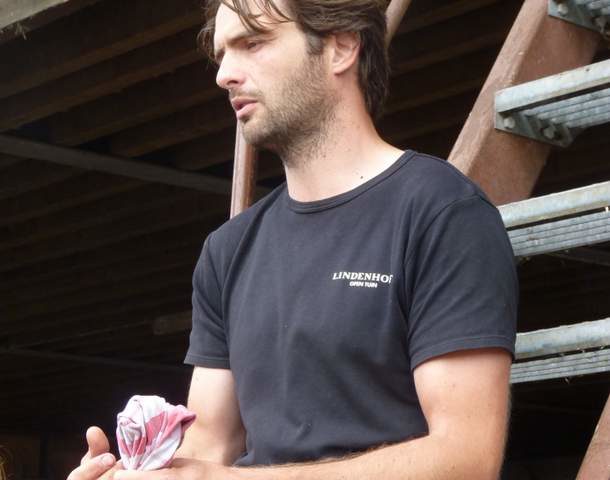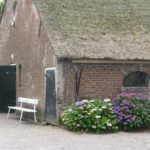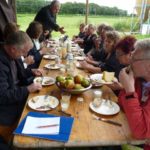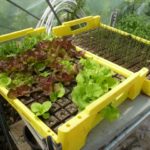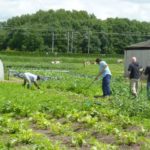Lindenhoff
Jonathan Vink
Target group: Homeless and addicted people
Type of care: Daily
Farm: Cattle, production of organic vegetables.
Income sources: 50% of income from agricultural activity and 50% from Care activity
| Jonathan is the bubbly manager and therefore the most important person on the Care Farm. He was ebullient and fiddled about with a red checked tea-towel during our entire conversation. For him agricultural production demonstrates a love of healthy food. Everything should be very spontaneous, simple and energising. Most importantly everything produced on the farm or nearby should be done naturally and organically.
Jonathan Vink has been managing the Care Farm since 2010. A friend of his from university inherited Lindenhoff from his parents, and he offered Jonathan the Care Farm manager’s job. According to Jonathan the key thing is only accepting participants who are passionate about working on the farm. He wanted to focus on addicts and homeless people since he had always been interested in “lost souls” and wanted “to help them to find themselves and recover”. Work is the key element of the care therapy provided. Jonathan treats the participants as co-workers and refers to them as such. Before starting work every prospective co-worker has to go through an interview which allows Jonathan to familiarize himself with the applicants and assess what they are able do. His goal is to build their self-esteem. These are often people who have never worked since leaving school. In Lindenhoff each person is allocated their task and area of responsibility. Jonathan does not accept the work methods implemented in the institutions for addicts since they do not require active participation. The key thing is that they have to be taught how to take personal responsibility for their own lives. When working with such people you have to be strict, demanding and direct and most importantly treat everybody with respect. Jonathan employs a psychologist who specializes in addictions and lives on the farm full-time, working with the participants; he helps to assess both their successes and failures. In Lindenhoff in addition to Jonathan and the psychologist there is a driver who delivers the fresh vegetables, herbs, eggs, meat and other products to restaurants and individual clients in Amsterdam. He is an former participant on the Lindenhoff farm project who managed to overcome his addiction and was subsequently employed by Jonathan as a permanent employee. They are also assisted by 2 volunteers who come to the farm twice a week. They have approximately 12 ‘co-workers’ each of whom comes to the farm 3-4 times a week. They are fed and each is paid a wage of 10 euro per day. The manager is very proud of them and says that out of the 35 of the participants so far 3 of them have managed to rebuild their life and secure a permanent job. However, there are also many who have never re-appeared after their first visit to the farm. Agricultural production in Lindenhoff is focused upon raising cattle for meat and growing vegetables. They also raise pigs, original French breeds from Gascony and the Pyrenees , as well as hens. The clients of Lindenhoff are the best restaurants in Amsterdam. The chef’s visit the farm to assess for themselves whether the individual vegetables are ripe enough to be harvested. Lindenhoff grows vegetables according to the special requests of the restaurants: small flowering zucchini, borage, fennel, leeks, beetroot, everything in small quantities. There is also an organic food shop on site selling food produced on this and nearby farms which sells other things amongst fresh zucchini of various colors and sizes, cured smoked hams, juicy tomatoes. Everything is seductive. All these products attract the buyer by means of their color and scent. They are beautifully presented in baskets or wooden boxes which bear the Lindenhoff logo. Jonathan emphasizes that his work is not only his job but it is also a life. His dream is to build a residential unit for the co-workers in Lindenhoff since their return to the city does not facilitate the therapeutic process. There are a lot of temptations there which cause them to relapse into addiction. |
“We obtain the best from the land therefore we give our best”
“Here people stop to being excluded” “Co-workers here do everything – they work in the garden, clean the barns, take care of the plants” “Farming is completely different from other professions, it is a lifestyle” “It is like a family here – we give a lot but we also expect a lot in return” “We are very forthright, we do not ask whether you took a shower, we just say – take a shower before you start work” “In the institutions they do not expect anything from them therefore they remain ill. It is different here, we have expectations” |

